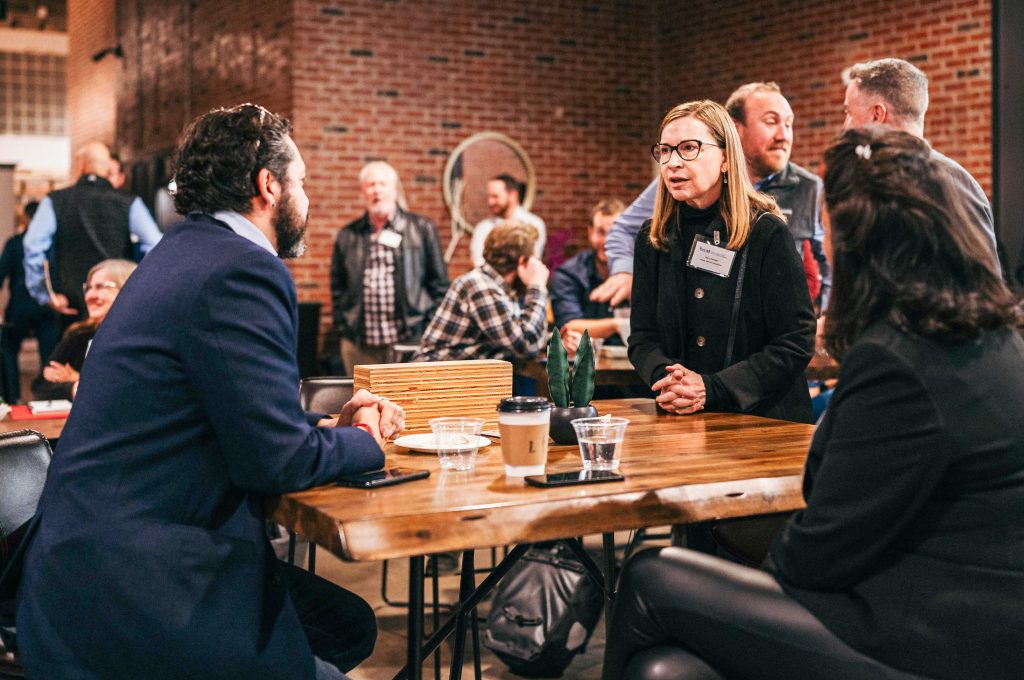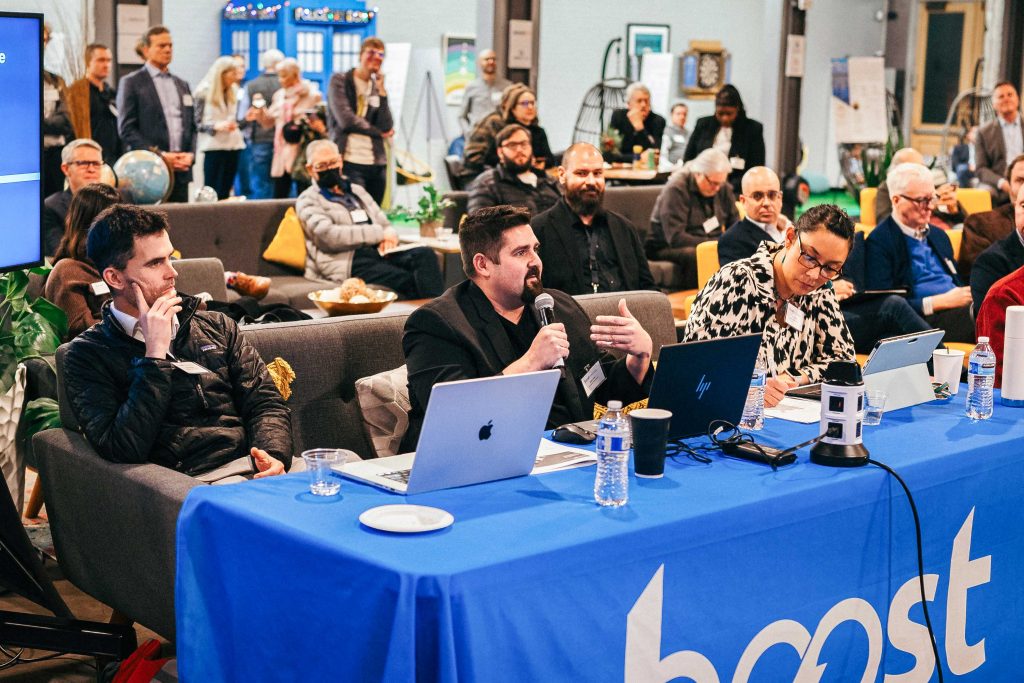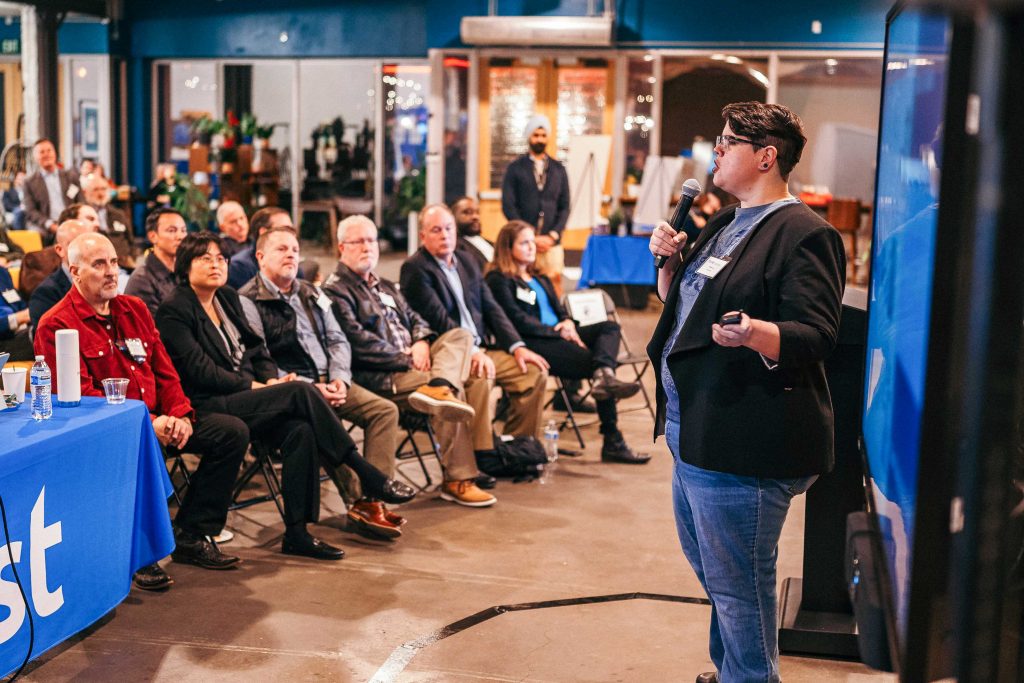New Sandia program rewards entrepreneurs fulfilling energy needs in New Mexico, Alaska

Grab your maps. On Dec. 12, entrepreneurs from New Mexico, Alaska, Illinois, Florida, Maryland, North Carolina and Texas attended a meeting of tech startups in Albuquerque. They pitched strategies for new ventures that could benefit remote communities in New Mexico and Alaska, aiming for a prize package of services from a consulting firm in Washington, D.C.
Sandia’s plan had worked out perfectly. Sandia and its partner, FedTech, hosted the networking event and pitch competition, the inaugural DOE Boost showcase. It was the culmination of months of work helping entrepreneurs solve specific energy needs in rural and remote communities by licensing national laboratory inventions.
Boost was funded in 2022 by DOE’s Technology Commercialization Fund with a mission to overcome barriers to commercializing federal energy tech.
“Our purpose, really, is to invite people into the Labs’ innovation ecosystem,” said Mary Monson, Sandia’s senior manager of technology transfer and business development, and the program’s principal investigator.
Sandia is recognized in its communities and by DOE for its standout ability to move technology out of the Labs and into the private sector.
“Sandia Labs is a powerful economic engine,” Mary said. “A recent study commissioned by NNSA demonstrated that over a 20-year period Sandia’s technology transfer program generated $140.2 billion in economic impact to the U.S.”
The Boost program focuses on tapping into areas of the country, she said, that are often overlooked in tech development — a sentiment FedTech director Thom Martin echoed in remarks at the showcase. “How do we move past the Silicon Valleys and the Bostons?” he said.
Startups navigate shifting economic winds
Boost enters a tumultuous scene for the deep tech startup community. High interest rates and tightening pocketbooks among venture capital firms have made it difficult for small, private companies to stay afloat. In December, The New York Times reported that at least 3,200 private-venture-backed U.S. companies went out of business in 2023, making it one of the worst years for startups in recent history.

On the other hand, a string of legislation, including the Inflation Reduction Act and the Infrastructure Investment Act, has directed a trillion dollars to the private sector for clean energy, offering Boost startups alternative funding sources.
Vanessa Chan, DOE’s chief commercialization officer and director of the Office of Technology Transitions, said in a prerecorded video shown during the event that the funds are an effort by the Biden administration to reach ambitious climate goals.
“We won’t get to our goals without a flood of new small businesses,” Chan said.
Boost participants Lori Eich, chief operating officer of HydrokinetX, and Heather Linn, chief executive officer of Cybrr Security, both said the decline in venture capital funding means they’re relying more on federal small-business grants to reach their initial goals.
A grassroots approach to business
D.C.-based firm FedTech provides entrepreneurs and innovators with a viable path toward commercializing federal technologies. With clients spanning across several government agencies, FedTech runs numerous Startup Studios annually. However, FedTech community manager Ellen Erickson said she’s never seen a partner approach the studio with a deep community focus like Sandia has.
The Boost program takes a community-centered approach to innovation by focusing on local energy challenges. Sandia hosted workshops across rural New Mexico and Alaska to listen to community members describe their local needs and challenges.
For example, oceanic researchers and members of fishing industries in Alaska raised concerns about the buoys they place in the ocean to collect data, such as climate information or the movements of marine life. These buoys need costly maintenance to have their solar panels cleaned and batteries replaced. Expeditions to service these remote stations by ship can cost buoy owners up to $25,000 monthly.

Sandia and FedTech searched for national laboratory intellectual property that could help solve this and other community problems.
Fifteen teams were accepted into the first DOE Boost cohort to develop go-to-market strategies for commercializing the national lab technologies. Over the course of 16 weeks, they received resources and coaching, and conducted more than 400 customer discovery interviews.
In the end, teams gathered for a pitch competition amid the industrial-chic trappings of Q Station, a coworking space and business incubator funded by the Air Force Research Laboratory in Albuquerque’s Nob Hill neighborhood. Winning teams were awarded prizes that included consultation packages from FedTech.
Eich, representing HydrokinetX, pitched an idea of a buoy powered by the ocean, reducing maintenance costs and potentially increasing the data that can be harvested from the sea. Each Boost company pitched a solution for a specific community challenge. These solutions included more efficient wind turbines, more efficient solar panels, a new kind of long-lasting battery, a new way to recycle lithium-ion batteries, cybersecurity for energy infrastructure, an artificial intelligence-based tool for allocating energy demands throughout a hospital and a system for improving microgrid resiliency.
In 2024, Sandia and FedTech plan to extend their outreach to 10 new communities, in addition to New Mexico and Alaska, and start a new cycle of venture creation.
FedTech senior associate Ish Singh said, “Expanding into new ecosystems to recruit entrepreneurial talent ensures that our program’s opportunities are accessible to all Americans, fostering equity and inclusivity in the pursuit of innovation and economic growth.”